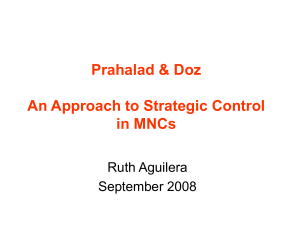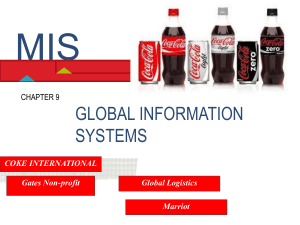GLOBAL MANAGEMENT
advertisement
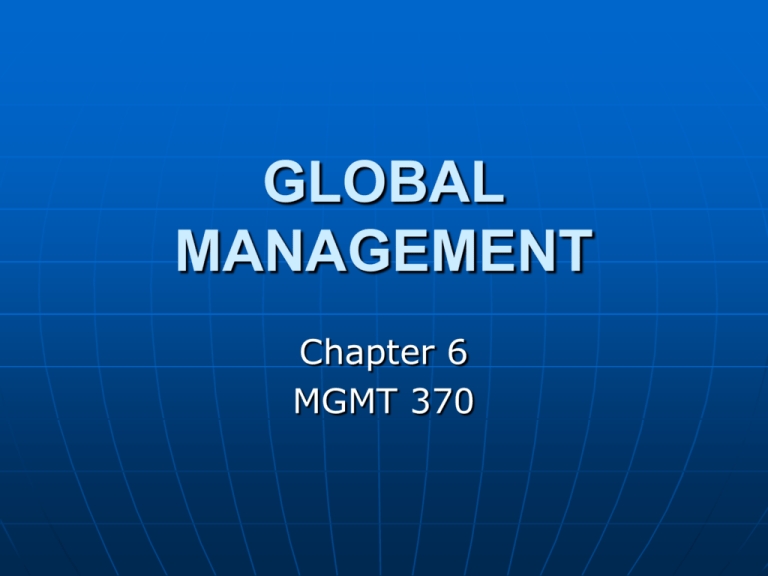
GLOBAL MANAGEMENT Chapter 6 MGMT 370 GLOBAL ENVIRONMENT The global economy is dominated by countries in three regions: North America, Western Europe, and Asia. Other developing countries and regions represent important areas for economic growth GLOBAL ECONOMY GLOBAL MANAGEMENT Global economy and globalization International management Global managers International Business Forms Market Entry Strategies •Global sourcing •Offshoring •Exporting and Importing •Licensing agreement •Franchising International Business Forms Direct Investment Strategies • Joint ventures • Foreign subsidiary Organizational Models Organizational Models Multinational model • consists of the subsidiaries in each country in which a company does business, with ultimate control exercised by the parent company. Global model • consisting of a company’s overseas subsidiaries and characterized by centralized decision making and tight control by the parent company over most aspects of worldwide operations Managing Across Borders Expatriates • Parent-company nationals who are sent to work at a foreign subsidiary Host-country nationals • Natives of the country where an overseas subsidiary is located Third-country nationals • Natives of a country other than the home country or the host country of an overseas subsidiary. Managing Globally 15% of all employee transfers are to international locations Failure rate ranges from 20%-70% Failure rate • the number of expatriate managers of an overseas operation who come home early • Communication is key to reducing the failure rate Identifying International Executives How to Prevent Failed Global Assignments Organizational Models Transnational model • characterized by centralizing certain functions in locations that best achieve cost economies • basing other functions in the company’s national subsidiaries to facilitate greater local responsiveness • fostering communication among subsidiaries to permit transfer of technological expertise and skills. Comparison of Entry Modes Comparison of Entry Modes Advantages of exporting: Provides scale economies by avoiding the costs of manufacturing in other countries Consistent with a pure global strategy Organizational Models International licensing • an arrangement by which a licensee in another country buys the rights to manufacture a company’s product in its own country for a negotiated fee (typically, royalty payments on the number of units sold). Global Organizations Ethical Issues • Corruption • Sweatshops • Child labor • Sustainability Regional Economic Alliances European Union • Europe is integrating economically to form the biggest market in the world • Certain structural issues within Europe need to be corrected for the EU to function effectively. North American Free Trade Agreement (NAFTA) • An economic pact that combined the economies of the United States, Canada, and Mexico into one of the world’s largest trading bloc U.S. Trading Partners Based on Total Imports and Exports GLOBAL ENVIRONMENT Legal Environment • World Trade Organization (WTO) • Most favored nation • Protectionism CONSEQUENCES OF A GLOBAL ECONOMY 1. 2. 3. 4. Expansion of international trade Foreign direct investment (FDI) is playing an ever-increasing role in the global economy Imports are penetrating deeper into the world’s largest economies Companies are finding their home markets under attack from foreign competitors Growing Proportion of Goods Being Exported Consequences of a Global Economy Opportunities are greater Environment is more complex and competitive Relative Growth in World Merchandise Trade Culture and Global Diversity Ethnocentrism Culture shock Cultural Intelligence Culture types • Low-context vs. high-context • Monochronic vs. polychronic • Proxemics Values and Societal Cultures Power distance Uncertainty avoidance Individualism vs. Collectivism Masculinity vs. Femininity Short vs. Long-term Focus PROJECT GLOBE ON CULTURE Power distance Uncertainty avoidance Gender egalitarianism Future orientation Institutional collectivism In-group collectivism Assertiveness Performance orientation Humane orientation Understanding Cultural Issues Inpatriate • A foreign national brought in to work at the parent company. Regardless of nationality or religion, most people embrace a set of five core values: compassion, fairness, honesty, responsibility, and respect for others. • These values lie at the heart of human rights issues and seem to transcend other differences among Americans, Europeans, and Asians MANAGING ACROSS CULTURES Comparative management Hofstede studies • Are management theories universal? • Global organizational learning
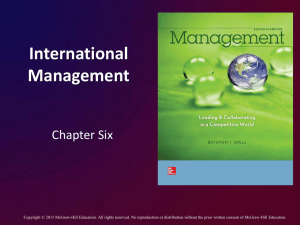
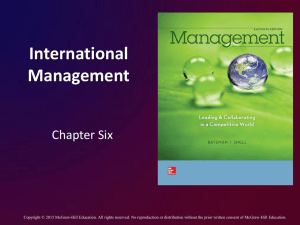
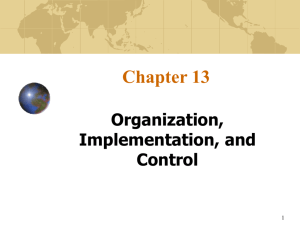
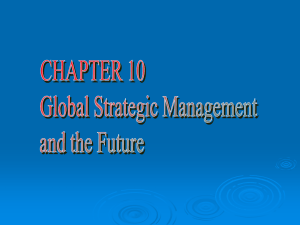
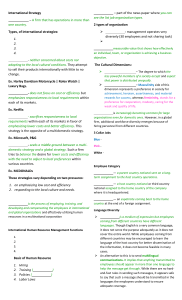
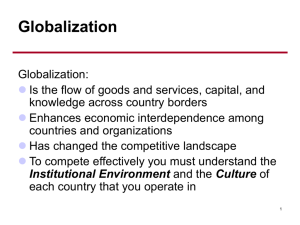
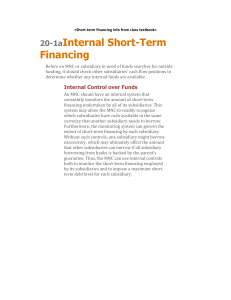
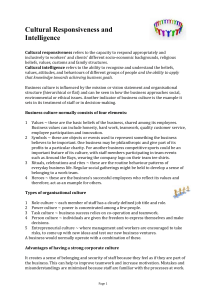
![[DOCX 51.43KB]](http://s3.studylib.net/store/data/007172908_1-9fbe7e9e1240b01879b0c095d6b49d99-300x300.png)
